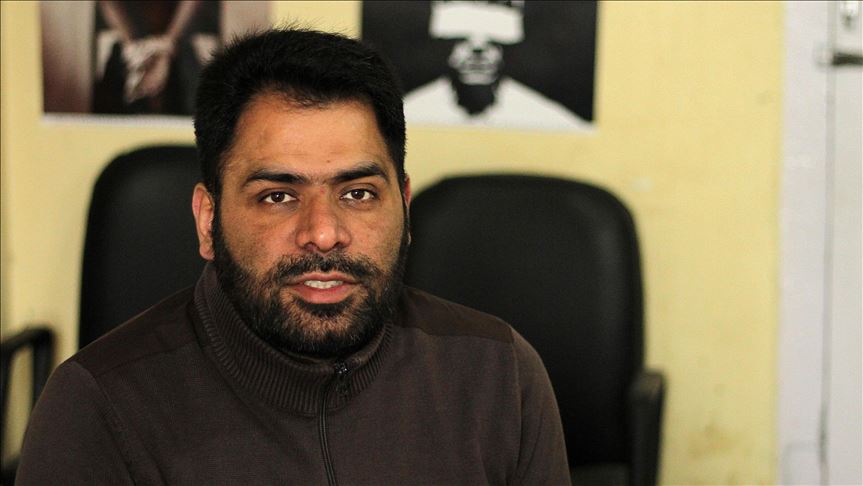‘India’s Kashmir act aims to disempower, exclude local population’
Khurram Parvez, noted human rights defender says since last year Kashmiri have been ejected from decision-making process

SRINAGAR, Jammu and Kashmir
A constitutional change, which needs deployment of tens of thousands of additional soldiers and shoved down the throats of the people for the past year, has no moral validity, says Kashmir’s top human rights defender.
Recipient of the 2006 Reebok Human Rights Award and Coordinator for Jammu and Kashmir Coalition of Civil Society (JKCC) Khurram Parvez told Anadolu Agency in an exclusive conversation that the only goal for last constitutional changes appears to completely disempower and disenfranchise local population.
“By breaking all commitments and forcing changes in Kashmir through military means would not alter the reality of Kashmir. Israel did all this but the Palestine issue is still alive and more than ever the world is behind Palestinians,” he said.
The noted human rights defender said the revocation of the special status has violated UN Resolutions on Kashmir as also the bilateral commitments with Pakistan.
Parvez pointed out that over the past year even those who swore by the Indian constitution and had defended India’s case on Kashmir at international forums were jailed.
“When New Delhi did not spare its people, you can imagine the fate of the resistance leadership and the masses who have revolted against the Indian rule,” he said.
The human rights defender, who also heads the Asian Federation Against Involuntary Disappearances pent 76 days behind bars under the stringent preventive detention law, the Public Safety Act during the mass uprising in 2016 triggered by the killing of militant commander Burhan Wani.
A few years ago, Parvez’s initiative led the largest alliance of militant groups in the region United Jihad Council to abandon using landmines.
The rights activist pointed out that the human rights situation was already “so bad” that the Office of the United Nations High Commissioner for Human Rights released its first-ever report on Jammu and Kashmir in 2018.
- Disregard for all verbal and written pacts
Even then Commissioner Zeid Ra’ad al Hussein said the political dimensions of the dispute between India and Pakistan have long been at the center-stage and the conflict is not frozen in time.
But rather than addressing these concerns, Parvez said, India scrapped special provisions in utter disregard for all written and verbal pacts with Kashmiris.
“For the past two years, Kashmir is being ruled directly by New Delhi. Kashmiris are nowhere in the decision-making process. Dissent has been choked and political spaces have been annihilated,” said Parvez.
Since Aug. 5, several UN rapporteurs had expressed concern over the situation in Kashmir and sought replies from New Delhi.
“The Indian government has not replied to any communication by the UN Special Procedures, at least six I think. This disregard for a world body comes at a time when India has been lobbying hard for a permanent seat in the UN Security Council. It is also ironic that India is a member of the UN Human Rights Council which is composed of 47 members from across the globe,” said noted human rights defender.
Further, besides political leaders, journalists were booked under an anti-terror law for writing opinions and posting photos on social media.
“The constitutional changes have been accompanied by a comprehensive suspension and subversion of human rights. For months there was no internet. High-speed internet is still banned. Children were deprived of education. Businesses suffered billions of dollars in losses,” he said.
All administrative and legal changes made affected by the government over the past year do not involve the people of Kashmir. It violates the International Covenants on Civil and Political Rights and the International Covenants on Cultural, Economic and Social Rights, Parvez noted.
Khurram added there has been no letup in the “so-called encounters” between militants and Indian forces, in which so far about 145 “ill-equipped and ill-trained local militants have got killed.”
He said these encounters amount to extrajudicial killings and these happen because there are cash rewards for killing militants. “There is no incentive in arresting them. It is clear that the institutionalized policy is to kill, not arrest,” he said.
Kashmir is held by India and Pakistan in parts but claimed by both in full. A small sliver of the region is also controlled by China.
Since they were partitioned in 1947, New Delhi and Islamabad have fought three wars -- in 1948, 1965, and 1971 -- two of them over the disputed territory.
Some groups in Indian-administered Kashmir have been fighting against Indian rule for independence, or unification with neighboring Pakistan.








